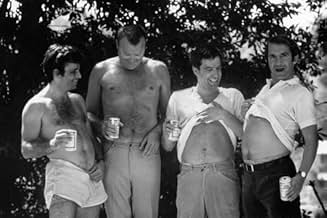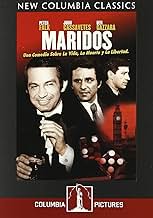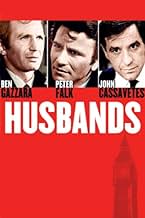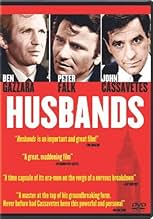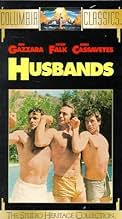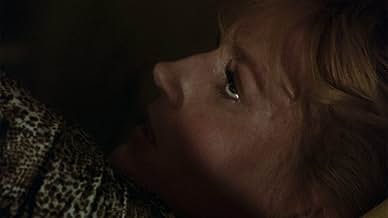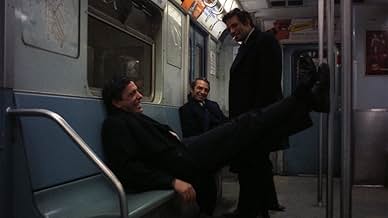एक आम दोस्त की मृत्यु के बाद, तीन विवाहित पुरुष एक साथ अपना सक्रिय जीवन छोड़ देते हैं, आनंद और स्वतंत्रता को तलाशते और अंततः लंदन के लिए रवाना हो जाते हैं.एक आम दोस्त की मृत्यु के बाद, तीन विवाहित पुरुष एक साथ अपना सक्रिय जीवन छोड़ देते हैं, आनंद और स्वतंत्रता को तलाशते और अंततः लंदन के लिए रवाना हो जाते हैं.एक आम दोस्त की मृत्यु के बाद, तीन विवाहित पुरुष एक साथ अपना सक्रिय जीवन छोड़ देते हैं, आनंद और स्वतंत्रता को तलाशते और अंततः लंदन के लिए रवाना हो जाते हैं.
- पुरस्कार
- कुल 1 नामांकन
- Annie
- (as Meta Shaw)
- 'Normandy' Singer
- (as Eleanor Gould)
फ़ीचर्ड समीक्षाएं
The story's basic premise renders an interesting theme. Given some traumatic event, like the death of someone we know, it's natural to grieve and reflect on the choices we've made. We thus gain perspective. But these guys seem oblivious to that process. Their only interest is juvenile self-indulgence of the moment, which creates behavior that is boorish and crude. I could not get interested in them or their drama. Nor did I have any respect for them.
The film's visuals are okay. But the runtime is way too long. A ninety-minute plot would have gotten the point across. Every minute beyond that is superfluous. Some segments are painfully drawn-out, like the one wherein they sit around a table in a bar getting drunk and listening to other people sing silly songs. And the script's dialogue is very talky. Basically, the entire plot can be summarized as three guys getting drunk, vomiting, and talking endlessly about themselves.
Acting is borderline at best. Some scenes encourage improvisation in acting and dialogue. Visuals trend conventional. There are a lot of close-up shots.
"Husbands" tries to be a social commentary on the ties that bind. But the plot and characters are rather awful. Direction and performances trend pretentious and self-conscious. And the whole bloated production seems misguided.
After the death of their friend, three middle-aged men - Harry (Ben Gazzara), Gus (Cassavetes) and Archie (Peter Falk) - find it difficult to cope. We follow them over the course of two days, where they drink heavily, play basketball together, and have a boisterous singing contest with friends and family. After returning home from his binge, Harry is thrown out by his wife, and shortly after announces he is flying to London. Seemingly with nothing better to do, Gus and Archie decide to join him, where they indulge is more drinking, gambling, and womanising. Gus finds himself with a much younger woman named Mary (Jenny Runacre), who is wild and unpredictable.
In the same vein as Faces (1968), Cassavetes adopts a cinema verite style, while taking the story and characters to almost hyper-reality. This is not quite the world we live in, only it feels like it. It's a more extreme world, where everything is just a little bit more depressing and the inhabitants are always loathsome in one way or another. It's as if Cassavetes wants us to take a real look at ourselves, whoever we are, and be repulsed. Harry, Gus and Archie are despicable, taking no second thoughts when committing adultery, and ultimately being loud, angry and disgusting when in the presence of others. They are also empty, devoid of any real emotion, only finding any real solitude in each other's company.
Judging from the title, Cassavetes uses the film to summarise a broad idea as to why men must go through this at some point in their life. The trio are little more than wild children, only with sexual experience, and the camera, as usual, is close, capturing the slightest facial movement, almost to the point of infringement. It's a depressing, brutal experience, where scenes go on for much longer than they should, making us want to get away from these characters. But maybe that's the point, and Cassavetes takes it to the extreme to push his point across. The final scene is certainly worth the wait however, managing to depict a character in one simple close-up as both tragic and pathetic.
www.the-wrath-of-blog.blogspot.com
This was the first Cassavettes movie I've ever seen. I liked it, which was surprising because this is not the sort of movie I'm generally interested in. There's almost no plot to speak of, most of the movie feels improvised (although improvised along certain set themes -- one does feel the heavy hand of the director here and there). It's a slice of life movie that still feels pretty rough and daring; I imagine in 1970, when this came out, people couldn't make hide nor hare of it.
Like most movies of this type, the big flaw is structure. The movie takes forever to get going, and doesn't really seem to know when to quit: the last reel, in particular, felt a little long to me. Plus, as I said, there is here and there a sense of a structure being imposed from without: the guys don't just do anything, they do certain set things for "character revelation" sake.
The acting, which is the crucial thing in a movie like this, of course, doesn't disappoint. All three men are very believable: they delineate their macho world quite well, with it's romanticism, bathos, insecurities and obnoxiousness. They're similar types of guys, which bothered me a lot at first but upon reflection made a lot of sense, since in real life we tend to be friends with people like us. Still, there are gradations and variations: Falk is inarticulate and sensitive, Gazzara despairing, Cassavettes is fumbling toward some kind of self-recognition.
The cinematography is absolutely stunning -- I might have seen a particularly nice print but this took me by surprise. Most of the movie is shot in warm, earthy, romantic tones, which sets the mood of nostalgia and dreams well, I think. Every now and then, though, we get a cold, full-on daytime shot where everyone looks naked and blinking under a frigid sun; it's a good counterpoint.
This is an important film by an important director. He'll never be a favorite of mine, but I'll definitely check out other work of his. You'll be doing yourself a favor if you do the same.
क्या आपको पता है
- ट्रिवियाScreenwriter John Cassavetes wrote the film's dialogue after doing improvisations with actors Ben Gazzara and Peter Falk. Reportedly, Cassavetes built the film's three main central characterizations around the real-life personalities of the film's three main actors one of whom included himself.
- भाव
Archie Black: [Arriving at the funeral] I suppose this is proper, all these big cars and chauffeurs. Black shiny cars. Seems dopey for a guy like that. Well, I guess that's what they do. People get symbolic over death. They get very formal, and it's really ridiculous. Because it's probably the most humiliating thing in the world. But I feel very relaxed. People die of tensions. That's all they die of, Gus. That's the truth. Did you know that? I know it, and it's something I'm never gonna forget.
Gus Demetri: Don't believe truth. Just don't believe truth. Archie, I'm telling you, don't believe truth.
Archie Black: That is the truth now. You see, the truth will never kill you. Lies will. Not cigarettes, not alcohol. Lies, Gus. Lies and tensions. That'll kill you. That'll kill you before cancer in the heart. Did you know that?
- क्रेज़ी क्रेडिटThere are no closing credits and no "THE END" title card. The screen just goes black. In the opening credits, everyone involved in the film (even the "little people") are credited on two "tell all" title cards, right on down from the actors to the grips, a total of 82 credits.
- इसके अलावा अन्य वर्जनThe original theatrical release ran 154 minutes. The out-of-print VHS release from Columbia/Tristar runs 132 minutes.
- साउंडट्रैकShow Me the Way to Go Home
(1925) (uncredited)
Written by Irving King
Sung a cappella by Ben Gazzara, Peter Falk and John Cassavetes
टॉप पसंद
- How long is Husbands?Alexa द्वारा संचालित
विवरण
- रिलीज़ की तारीख़
- कंट्री ऑफ़ ओरिजिन
- भाषाएं
- इस रूप में भी जाना जाता है
- Husbands: A Comedy About Life, Death and Freedom
- फ़िल्माने की जगहें
- उत्पादन कंपनी
- IMDbPro पर और कंपनी क्रेडिट देखें
बॉक्स ऑफ़िस
- बजट
- $10,00,000(अनुमानित)
- दुनिया भर में सकल
- $2,735
इस पेज में योगदान दें



